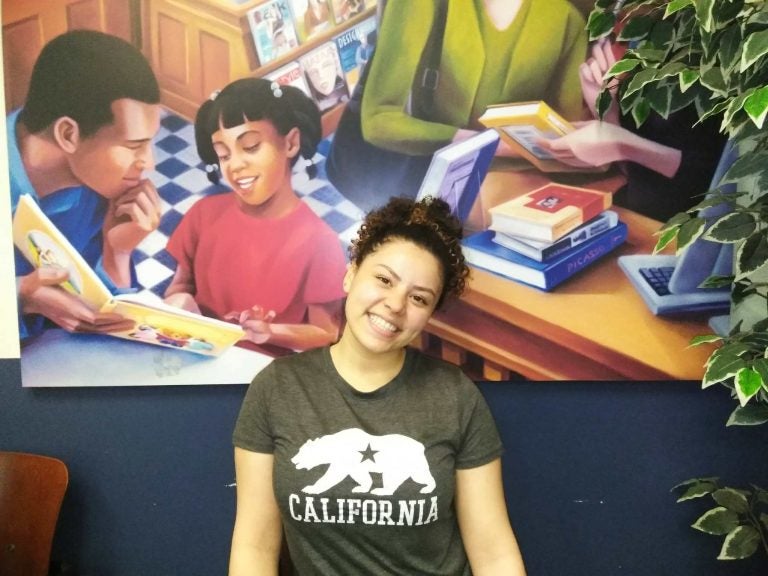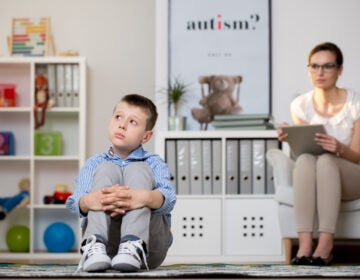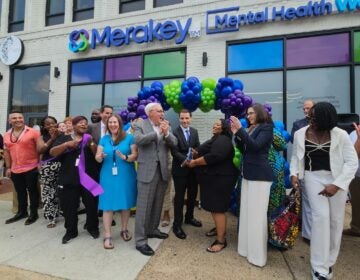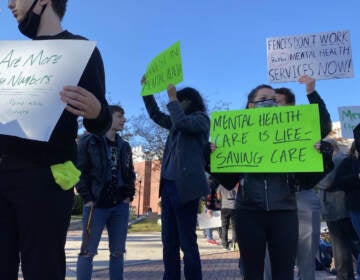Letting go of anger in North Philly
Seventeen-year-old Sophia Angelica Delgado Feliciano says for a long time she used emotional distance as a survival tool.
Listen 5:20
Seventeen-year-old Sophia Angelica Delgado Feliciano says for a long time she used emotional distance as a survival tool. Today she's thriving. (Courtesy of Sophia Delgado)
In North Philadelphia, some teen girls live by the credo: “cold is cute.” Anger and emotional distance are crucial survival tools. For Sophia Delgado, these tools stopped working. To start reaching her goals, she had to make a shift.
My name is Sophia Angelica Delgado Feliciano. I’m third generation Puerto Rican, and let me tell you, it’s a long walk from the sounds of the coqui frog at night to sirens and gunshots. I’m from North Philly — but my family and I lived in Puerto Rico when I was younger.
My life can be really stressful. Not having enough money, getting paid late, and getting hassled by boys even though they know I have a man — it’s like a full time job. So if you see me walking down the street, you might see an angry teenager. But if you really got to talking to me, you would see that I’m just as nice as anyone else.
My mom told me that crying was a sign of weakness, so throughout my life, I’ve chosen to get angry rather than show I was hurt.
Picture this: Two girls are complaining loudly to my teacher. They can’t find their binders. I know why. They’ve been skipping school for weeks and someone probably took them. I just can’t. They’re acting so childish. Later, one of the girls says she wants to talk to me. I automatically get a fishy feeling. This is not good.
“Excuse me,” she says, “but why were you staring at me and my friend?”
I turn to my teacher, “Miss, you know I can’t with this drama.” I leave.
“Oh, you’re gonna walk away?” they yell.
I tell my friend to hold my bag. I take off my shoes. They want a fight? I’ll give them a fight.
I’m punching, I’m pulling someone’s hair. I realize it’s my teacher’s. But at that point, I’m blacked out. I can’t think straight.
Fights like these got me into trouble at my old school.
I got detentions. I missed those. They started suspending me. I got unmotivated. Any little thing they said to me would make me pop off.
I feel like girls aren’t allowed to get angry. If a boy gets mad, it’s all good. He’s just going through it. But a female can’t have a rough day — the response is like, ‘oh, now we’re seeing your true colors.’
Finally, a school police officer and I had an altercation. He put his hands on me to get me out of a chair. I snapped. I threw fists.
Everything I did was a problem from that point on. I became a stereotype to them. The angry teenage girl from a poor community. They told me to go home after that altercation — but I knew I was never going back.
But then I found El Centro de Estudiantes. It’s an alternative public school. And everything changed. It makes me emotional just to talk about it. They treated me like a human.
I never used to get excited preparing for the week. But on Sundays before El Centro, I would actually sing as I got ready. The school worked with me. They even let me order food if I was hungry. They didn’t make every little thing a problem, or a war.
I felt like the people at my school had my back. I was given some leadership, and I basically became a teacher’s assistant. I actually graduated early from my school.
I’m still in shock.
I’m still amazed that I did it. I didn’t drop out. I graduated earlier that I was supposed to. I’m just like: Damn, I’m poppin’.
Here’s why I think things worked out for me there:
If I came in sad, I had everyone around me. I felt so supported. I got a new family. The principal was like my older brother. My counselor was like my grandma.
I feel like I’m much more patient now, because El Centro taught me how to feel safe and trust the people around me.
I started putting the pieces together about my anger. I realized that for me, a big trigger is if I’m going through hard times with my boyfriend. When something goes wrong with us, I feel like my emotions are totally hijacked. I can’t concentrate. Now, I’m letting myself feel sad instead of acting out.
I realized that my anger had been hiding my sadness.
Girls my age in North Philly like to say that “cold is cute.” Like, the better the front you put up, the cuter you are.
But it’s not cute, because it’s not real.
But it doesn’t make me mad anymore. It makes me sad. I feel for them, I feel it. I know what they’re going through.
I get those girls more now, I really do.
Now if a girl asks me why I was staring at her — I’ll just say, “I thought you was pretty, sorry if I made you uncomfortable.”
I just don’t care anymore. I wanna be good to everyone.
It’s like that J. Cole song, “False Prophets.” I love that one line:
“Therefore from here on out, my hair grows out, I care nothin’ ’bout opinions. I wanna give hope, like the fountains you throw pennies in.”
Now I want to do so much. That’s my problem right now, but I don’t know where to start. I know I’m going to help people. So, I’m eager and scared.
Before, I felt trapped. I lived in fear that I would become that stereotype. 16, pregnant, and a high school dropout. I hated that.
That’s what kept me pushing.
___
Sophia Delgado and Anne Hoffman collaborated on this story for Philly Audio Diaries, a program that teaches young people to tell stories and record their lives. Support from The Scattergood Foundation made this story possible.
WHYY is your source for fact-based, in-depth journalism and information. As a nonprofit organization, we rely on financial support from readers like you. Please give today.






